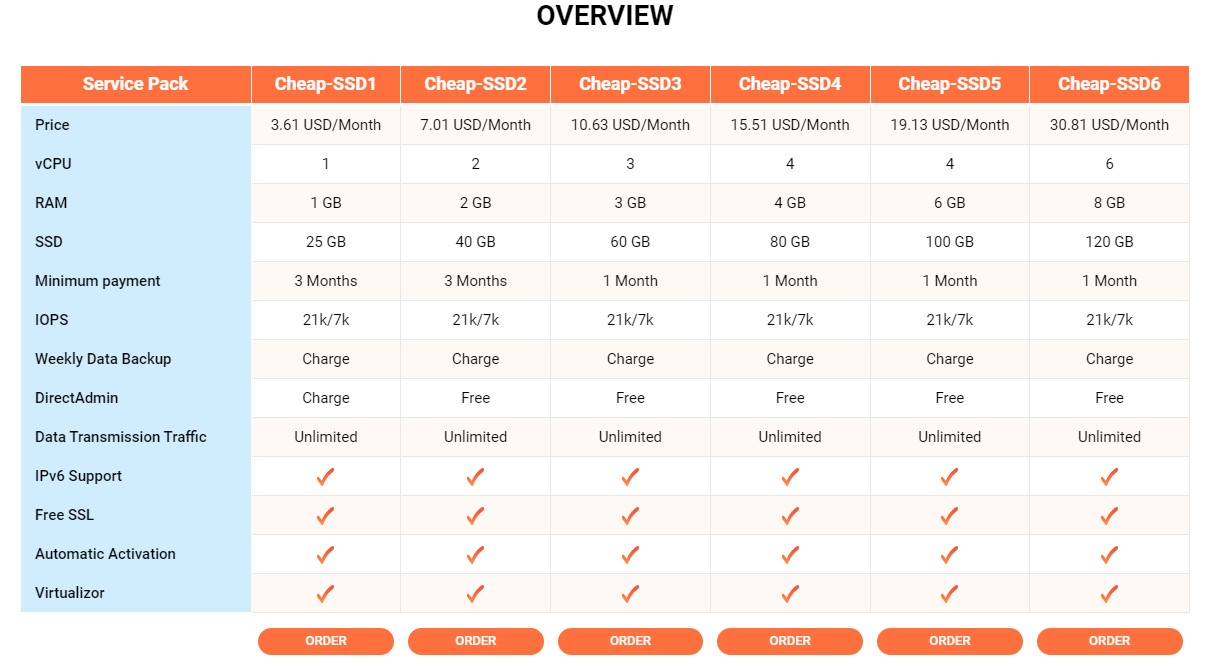When comparing SSD VPS to regular VPS hosting, the former’s benefits clearly outweigh the additional costs. While SSD VPS hosting is generally more expensive due to the advanced technology involved, the investment is justified by the significant gains in performance, reliability, and energy efficiency. For users who prioritize speed, security, and long-term value, VinaHost thinks SSD VPS hosting is an optimal choice. Let’s see what is SSD VPS hosting, how it works, and should you use it!
1. What is SSD VPS Hosting?
Also Read: What is Linux VPS? | Choosing the Right Linux VPS Provider
2. Key Features of SSD VPS Hosting
SSD VPS hosting offers high performance, reliability, scalability, security, and energy efficiency, making it an excellent choice for websites and applications that require fast and reliable hosting services.
- Improved overall performance: The rapid data access speeds of SSDs translate to better overall server performance. This is beneficial for applications requiring frequent data access, such as databases, e-commerce platforms, or content management systems (CMS) with high traffic.
- Reduced latency: Lower latency translates to faster response times for your server. This is crucial for real-time applications like online gaming or video conferencing, where even slight delays can be detrimental.
- Dedicated resources: Like traditional VPS hosting, SSD VPS provides dedicated resources (CPU, RAM, storage) for your virtual server. This ensures consistent performance and prevents slowdowns caused by other users sharing the same physical server.’
- Scalability: SSD VPS hosting plans typically offer scalable resources, allowing users to easily upgrade or downgrade their server resources as their requirements change.
- Enhanced reliability: SSDs have no moving parts, making them more durable and less prone to mechanical failure than HDDs. This improves the reliability and uptime of SSD VPS hosting services.
- Better I/O performance: SSDs provide faster input/output (I/O) performance, which is beneficial for applications that require rapid data retrieval, such as databases and high-traffic websites.
- Increased security: SSD VPS hosting providers often implement robust security measures to protect against data loss, malware, and other security threats, ensuring the safety of users’ data.
- Improved user experience: The faster loading times and improved performance provided by SSDs contribute to a better user experience for website visitors and application users.
3. Benefits of Using SSD VPS Hosting
SSSD VPS Hosting offers a balance of performance, customization, scalability, reliability, and cost compared to Shared Hosting and Dedicated Servers. With SSDs providing faster read/write speeds, users benefit from improved website loading times and data access.
SSD VPS Hosting strikes a cost-effective balance between performance and affordability, making it an attractive option for many users.
Additionally, SSD VPS Hosting allows for greater customization and control over the hosting environment compared to Shared Hosting, while still offering scalability to accommodate changing needs. While Dedicated Servers offer similar levels of customization and reliability, they come with a higher price tag.
Here are the key benefits of SSD VPS Hosting:
- Mechanism: Traditional HDDs rely on spinning magnetic disks, akin to the mechanism of vinyl records, for storing data. However, the constant spinning (about 3.8 billion rotations per year) can lead to wear and eventual mechanical failure. SSDs, in contrast, utilize flash memory chips interconnected in a solid-state drive, eliminating the need for moving parts. This NAND-based flash memory ensures greater durability, even when the device is powered off.
- Speed: The absence of moving parts in SSDs results in significantly faster read and write speeds compared to HDDs. With NAND flash memory, SSDs offer high read and write speeds, outpacing the rotational latency of HDDs. This translates to faster loading times for websites, which is crucial for improving SEO rankings and enhancing the user experience.
- Data security: SSDs provide faster processing times and are less prone to failure from increased I/O requests, reducing the risk of data loss. Additionally, SSDs have no mechanical parts that can wear out over time, ensuring greater reliability and safety for hosting data.
- Full Root access: SSD VPS hosting typically offers full root access, allowing users to customize their server environment according to their preferences and requirements. This level of control ensures greater flexibility and adaptability for hosting various applications and services.
- Search engine impact: Websites hosted on SSD VPS servers are likely to rank higher in search engine results due to faster loading times and smoother performance compared to those hosted on HDDs. This can lead to increased visibility and traffic for websites, ultimately benefiting their online presence.
- Power usage: SSDs consume less energy than HDDs, resulting in lower power costs and extended battery life for devices. Additionally, the absence of moving parts in SSDs reduces noise levels, creating a quieter server environment compared to HDD-based hosting solutions.
- Environmental factor: SSDs consume less power and generate less heat compared to HDDs, making them more environmentally friendly and cost-effective in terms of energy consumption. By opting for SSD VPS hosting, users can contribute to environmental sustainability while saving on power costs.
Also Read: What is Linode VPS? | Everything You Need to Know
4. Common Use Cases for SSD VPS Hosting

SSD VPS hosting is used by a variety of users, including small and medium-sized businesses, web developers, e-commerce entrepreneurs, content creators, gaming communities, data analysts, digital agencies, and tech startups.
These users benefit from the fast loading times, high performance, reliability, and scalability of SSD VPS hosting for their websites, applications, gaming servers, data analytics platforms, and digital initiatives.
You can take a look for some common use cases for SSD VPS Hosting:
- Web hosting: Hosting websites and web applications that require fast loading times and high performance.
- E-commerce: Powering online stores and e-commerce platforms that handle high volumes of traffic and transactions.
- Development and testing: Providing development and testing environments for developers to deploy and test applications quickly.
- Database hosting: Hosting databases that require rapid data retrieval and processing.
- Content Management Systems (CMS): Hosting websites built on CMS platforms such as WordPress, Joomla, or Drupal.
- Media streaming: Hosting media streaming services for video or audio content.
- Gaming servers: Hosting multiplayer online gaming servers for smooth gaming experiences.
- Data analytics: Hosting data analytics platforms for fast data processing and analysis.
Here are a few case studies showcasing how different users leverage the power of SSD VPS hosting:
E-commerce boost:
- Trendy Tees, a small online t-shirt store, struggled with slow loading times on their shared hosting plan during peak seasons ledding to frustrated customers as well as lost sales.
- By switching to SSD VPS hosting, they saw a 70% decrease in loading times and a 25% increase in conversion rates thanks to the improved user experience. The ability to easily scale resources during sales ensured smooth operation even with high traffic volumes.
Gaming community thrives:
- Phoenix Gamers, a Minecraft server community, faced lag and frustrated players due to the limitations of their shared hosting plan.
- Upgrading to SSD VPS hosting specifically designed for gaming eliminated lag with its low latency and high performance. This allowed them to accommodate more players, expand their community, and experience a surge in player satisfaction.
Development workflow enhanced:
- Technovation Inc., a software development company, battled slow deployment times and sluggish performance in their shared hosting environment.
- Implementing SSD VPS hosting for their development and testing environment resulted in a 50% reduction in deployment times and an overall improvement in application performance. This streamlined workflow allowed the development team to iterate and test features more quickly, leading to faster product releases.
5. Choosing the Right SSD VPS Hosting Provider
Finding the perfect SSD VPS hosting provider requires careful consideration of several factors as below:
5.1. Reputation and Customer Service
- Look for providers with a strong reputation for reliability, performance, and security.
- Check online reviews and industry publications to see what other customers are saying.
- Ensure the provider offers responsive and knowledgeable customer support to address any issues you might encounter.
5.2. Hardware Specifications and Scalability

- Consider the hardware specifications offered by the provider, including CPU cores, RAM capacity, and storage space. These resources should align with your anticipated needs.
- Look for providers who allow you to easily scale your resources up or down as your requirements evolve. This makes sure that you only pay for what you use.
5.3. Pricing and Value for Money
- SSD VPS hosting typically comes at a premium compared to shared hosting, but it offers significant performance benefits.
- Compare pricing plans from different providers, considering the resources offered, features included, and any additional costs like backups or control panel fees.
- Focus on finding the best value for money, not just the cheapest option.
Also Read: [UPDATED] TOP 20 Best VPS Control Panel Free & Paid
5.4. VinaHost – The most reputable SSD VPS Hosting provider
VinaHost is is known as as one of the most reputable hosting provider based in Vietnam, offering a range of hosting services, including SSD VPS hosting.
Our VPS services are known for their reliability, performance, and scalability, catering to the needs of businesses and individuals alike.
VinaHost’s SSD VPS hosting solutions feature state-of-the-art hardware, including high-speed SSD storage and powerful processors, ensuring fast data access and optimal performance for websites and applications.
Additionally, VinaHost provides flexible scalability options, allowing users to easily upgrade or downgrade their resources as needed. With competitive pricing, transparent billing, and responsive customer support, VinaHost is a trusted choice for businesses seeking reliable SSD VPS hosting services in Vietnam.

Additionally, we also provide:
- Server Vietnam
- Colocation in Vietnam
- Server Cambodia
- SSD VPS Cambodia
- SSD VPS Thailand
- SSD VPS Indonesia
- VPS German
6. SSD VPS vs. HDD VPS: A Side-by-Side Comparison
6.1. Performance
| SSD VPS | HDD VPS |
|
|
6.2. Reliability
| SSD VPS | HDD VPS |
|
|
6.3. Cost
| SSD VPS | HDD VPS |
|
|
Also read: What is the difference between VPS and Dedicated Server?
7. The Future of VPS SSD

As SSD technology evolves and becomes more affordable, we can expect to see even faster and more reliable SSD VPS hosting options emerging in the market.
With the growing emphasis on speed, reliability, and scalability in the digital landscape, SSD VPS hosting is poised to become the preferred choice for businesses and individuals seeking top-notch performance for their websites and applications.
Additionally, as the need for data storage and processing continues to grow exponentially, SSD VPS hosting will play a crucial role in meeting these demands by providing efficient and cost-effective hosting solutions. Here are some trends about future of VPS SSD that we can expect:
Performance boost and continued Innovation:
- Advancements in SSD technology will likely lead to even faster read/write speeds and lower latency, further enhancing the performance capabilities of VPS SSD.
- Integration with cutting-edge technologies like NVMe (Non-Volatile Memory Express) could revolutionize storage access times, pushing the boundaries of VPS SSD performance.
Increased focus on security and scalability:
- Security features like hardware encryption built directly into SSDs will become more commonplace, offering an extra layer of protection for sensitive data stored on VPS SSDs.
- Providers will likely offer more granular control and flexible scaling options for VPS SSD resources, allowing users to scale their resources up or down seamlessly based on real-time needs.
Growing adoption and specialization:
- As the cost of SSD storage continues to decrease, VPS SSD will become even more accessible, leading to wider adoption across different types of web hosting needs.
- We might see a rise in specialized VPS SSD plans tailored for specific applications like high-traffic e-commerce platforms, real-time gaming servers, or resource-intensive development environments.
Serverless computing in VPS
- The trend of adopting serverless computing is growing. In the future, VPS hosting providers might incorporate serverless platforms, enabling users to run applications without the need for traditional server management. This approach highlights cost-efficiency and scalability.
Integration with Cloud Technologies:
- Ongoing advancements in virtualization technologies, including better hypervisors and containerization solutions, will improve the efficiency and resource utilization of VPS environments. Users can anticipate more seamless and quicker application deployments.
- Cloud integration with VPS SSD is likely to become more prevalent. This could allow users to leverage the on-demand scalability and flexibility of the cloud alongside the exceptional performance of VPS SSD.
- Hybrid cloud solutions, which combine VPS hosting with public cloud services, are becoming more common. The future of VPS hosting may involve seamless integration with major cloud providers, giving users the flexibility to expand their infrastructure as needed.
AI and Automation for VPS management:
- Artificial Intelligence (AI) and automation will be crucial in VPS management. Predictive analytics, automated scaling, and intelligent resource allocation are likely to become standard features, simplifying the management of VPS instances.
Customization and modular services:
- VPS vendor may move towards offering more modular and customizable services. Users could choose specific components such as storage, networking, and computing resources to create tailored VPS environments that meet their unique needs.
Also read: What is NVMe VPS? | The Difference between NVMe VPS vs SSD VPS
8. FAQs
8.1. Is SSD VPS hosting difficult to set up?

The difficulty of setting up SSD VPS hosting depends largely on your prior experience and the level of support provided by your hosting provider. For those without much technical expertise, opting for a managed VPS or a provider with robust setup tools and support can make the process much more manageable.
Many hosting providers offer user-friendly setup tools and interfaces that simplify the process. Some provide one-click installations for popular software and applications, which can significantly reduce the complexity of setting up your VPS.
Some providers offer pre-configured VPS plans tailored for specific use cases (e.x, web hosting, development environments). These plans come with necessary software and configurations already set up, making the process easier for users.
General steps may includes (can vary by provider):
- Choosing a plan and signing up: Select an SSD VPS plan that meets your needs and sign up with the provider.
- Accessing your control panel: Your provider will provide login credentials for their control panel.
- Setting up your server: This might involve configuring basic settings, choosing an operating system, and potentially allocating resources.
- Installing software (optional): You might need to install additional software depending on your needs (e.g., web server software, database software).
Choosing a managed VPS plan can significantly reduce the difficulty of setup, as the hosting provider takes care of most of the server management tasks, including initial setup, maintenance, security updates, and troubleshooting. On the other hand, an unmanaged VPS plan requires you to handle all aspects of setup and management, which can be more complex.
8.2. How much does SSD VPS hosting cost?

The cost of SSD VPS hosting can range from as low as $5 per month for basic plans to over $100 per month for high-performance or managed plans:
- Low-end plans: around $5-$10 per month. These entry-level plans typically include modest amounts of CPU, RAM, and storage. They are suitable for small websites, development environments, or personal projects.
- Mid-range plans: from $10-$50 per month. These plans offer more resources and are suitable for larger websites, small businesses, or moderate-traffic applications.
- High-end plans: from $50 to $100+ per month or more. These plans provide ample resources for high-traffic websites, large applications, or enterprise use. They often include enhanced performance features like dedicated CPU cores and high I/O speeds.
You can refer to VinaHost SSD VPS Hosting below:
| Service Pack | ProSSD 1 | ProSSD 2 | ProSSD 3 | ProSSD 4 | ProSSD 5 | ProSSD 6 |
|---|---|---|---|---|---|---|
| Price | 5.31 USD/Month | 11.48 USD/Month | 13.39 USD/Month | 19.13 USD/Month | 27.63 USD/Month | 37.83 USD/Month |
| vCPU | 1 | 2 | 3 | 4 | 6 | 8 |
| RAM | 1 GB | 2 GB | 3 GB | 4 GB | 6 GB | 8 GB |
| SSD | 25 GB | 50 GB | 50 GB | 60 GB | 80 GB | 100 GB |
| Minimum Payment | 3 months | 1 month | 1 month | 1 month | 1 month | 1 month |
| IOPS | 42k/14k | 42k/14k | 42k/14k | 42k/14k | 42k/14k | 42k/14k |
| Virtualization Technology | KVM | KVM | KVM | KVM | KVM | KVM |
| Weekly Data Backup | Free | Free | Free | Free | Free | Free |
| DirectAdmin | Free | Free | Free | Free | Free | Free |
| Data Transfer | Unlimited | Unlimited | Unlimited | Unlimited | Unlimited | Unlimited |
| IPv6 support | ||||||
| Free SSL | ||||||
| Automatic Activation | ||||||
| Virtualizor | ||||||
Beside, we also provide NVMe VPS with uutstanding speed comparison to SSD VPS Hosting Vietnam:
| Service Pack | VPS NVME 1 | VPS NVME 2 | VPS NVME 3 | VPS NVME 4 | VPS NVME 5 | VPS NVME 6 |
|---|---|---|---|---|---|---|
| Price | 9.50 USD/Month | 18.00 USD/Month | 24.00 USD/Month | 34.00 USD/Month | 49.00 USD/Month | 67.50 USD/Month |
| vCPU | 1 Core | 2 Core | 3 Core | 4 Core | 4 Core | 8 Core |
| RAM | 1GB | 2GB | 3GB | 6GB | 8GB | 8GB |
| NVMe | 20GB | 50GB | 60GB | 80GB | 100GB | 100GB |
| Minimum Payment | 3 Months | 1 Month | 1 Month | 1 Month | 1 Month | 1 Month |
| Virtualization Technology | KVM | KVM | KVM | KVM | KVM | KVM |
| Data Transfer | Unlimited | Unlimited | Unlimited | Unlimited | Unlimited | Unlimited |
| Weekly Backup | Free | Free | Free | Free | Free | Free |
| DirectAdmin | Free | Free | Free | Free | Free | Free |
| SSL | Free | Free | Free | Free | Free | Free |
| Automatic Activation | ||||||
| Virtualizor | ||||||
The cheapest option isn’t always the best. Choose a plan that offers the resources you need at a competitive price, with the features and support you require for a smooth hosting experience.
8.3. What are some good SSD VPS hosting providers?
Here are some top SSD VPS hosting providers that are well-regarded for their performance, reliability, and customer support:
Linode: Known for its developer-friendly services, Linode offers a range of SSD VPS plans with transparent pricing and a robust infrastructure.:
- High-performance SSD storage
- Multiple data centers worldwide
- Transparent and flat-rate pricing
- 24/7 customer support
- Managed and unmanaged plans
- Starts at $5 per month
DigitalOcean: DigitalOcean is popular for its simplicity and ease of use, providing scalable SSD VPS solutions known as Droplets.
- SSD-based storage
- Easy-to-use control panel
- One-click applications
- Extensive documentation and community support
- Multiple data centers
- Starts at $4 per month
Vultr: Vultr offers a wide range of SSD VPS options with flexible pricing and global server locations.
- 100% SSD storage
- High-performance Intel CPUs
- Hourly and monthly billing
- Wide selection of operating systems
- Block storage and load balancers
- Starts at $2.50 per month
A2 Hosting: A2 Hosting is known for its speed and reliability, offering managed and unmanaged SSD VPS plans.
- SSD storage included
- Turbo Boost option for faster speeds
- Managed and unmanaged plans
- Free site migration
- Anytime money-back guarantee
- Starts at $5 per month
InMotion Hosting: InMotion Hosting provides powerful SSD VPS plans with excellent customer support and managed options.
- SSD storage included
- Free cPanel license with managed plans
- Root access
- Free SSL certificates
- 24/7 customer support
- Starts at $17.99 per month
HostGator: HostGator is a well-known provider with a variety of hosting solutions, including SSD VPS plans.
- SSD storage included
- Fully managed options
- Free website migration
- Weekly off-site backups
- 24/7/365 support
- Starts at $19.95 per month
VinaHost (specifically for Vietnam): VinaHost is a reliable provider based in Vietnam, known for its quality SSD VPS hosting and local support.
- SSD storage for better performance
- Local Vietnamese data centers
- Excellent customer support
- Affordable pricing
- Managed and unmanaged options
- Starts at approximately $5.25 per month
Also read: Top 15 Best VPS Hosting Providers
8.4. Is SSD VPS more expensive than regular VPS?
8.5. Can I upgrade from HDD VPS to SSD VPS?

Yes, you can upgrade from an HDD VPS to an SSD VPS. Most hosting providers offer upgrade options that allow you to migrate your data and applications from an HDD-based VPS to an SSD-based VPS.
Upgrading to SSD VPS can significantly enhance your server’s performance, providing faster load times and better reliability. Steps typically involved:
- Contacting your provider: Reach out to your hosting provider’s support team to discuss the upgrade options and process.
- Backup data: Ensure all your data is backed up to prevent any loss during the migration.
- Migration: Your provider will assist with the migration, which may involve copying your data to the new SSD VPS and configuring it to match your previous setup.
- Testing: After migration, test your applications and services on the new SSD VPS to ensure everything is functioning correctly.
Notes for you:
- During the migration process, some downtime for your website or application is likely. Inquire with your provider about the expected downtime and any steps they take to minimize it.
- It’s neccesary to ensure a complete backup of your data before initiating the migration process. This safeguards your data in case of any unforeseen issues during the upgrade.
Also read: What is Windows VPS? | Who Should Use a Windows VPS?
9. Conclusion
In this article, we’ll explain what is SSD VPS Hosting, how it works, and why you might need one. Unlike traditional HDD VPS hosting, SSD VPS leverages the advanced technology of Solid State Drives, which offer significantly faster read/write speeds, contributing to quicker data access and improved overall server responsiveness.
This speed advantage is crucial for applications and websites that demand high performance, ensuring a seamless user experience and potentially boosting SEO rankings due to faster load times.
As technology continues to evolve, the advantages of SSD VPS hosting are likely to become even more pronounced, making it a compelling option for businesses and individuals alike. Whether you are running a high-traffic website, a complex application, or simply seeking a reliable hosting environment, SSD VPS hosting provides the performance and dependability required to meet your needs.
Find out more articles at our Blog and don’t hesitate to contact us for support:
- Email: support@vinahost.vn
- Hotline: 1900 6046
- Livechat: https://livechat.vinahost.vn/chat.php
>>> Read more:
What is GPU VPS? | Choosing the Right GPU VPS Provider
What is gaming VPS? | Choosing the Right gaming VPS Provider















